By Prabashini Moodly
| Every so often, you get an opportunity to be in the room when great minds meet. Such an opportunity presented itself at our recent inaugural Thought Leaders Forum, and what an energising and thought-provoking day it was! |
| Four panel discussions, each featuring local and international heavyweights, dove into many issues pertinent to both the world of retirement and the world of work today, and tomorrow. |
| This month, I thought I’d share what stood out most for me, and what we can learn from the visionary leaders and minds that attended the event. |
The 2023 Mercer CFA Institute Global Pension Index scored South Africa’s pension fund system 54 out of 100, with a C rating out of a possible A to E. Each country is unique, of course, but it was interesting to hear what top scorers like the Netherlands and Israel do.
Including more people and supporting them well is an important factor, explained Dr David Knox, a senior partner at Mercer based in Melbourne. The Mercer Index scores countries according to three criteria:
1. Adequacy (40%), relating to how much of the population the system covers, and how well.
2. Sustainability (35%), or to what extent the system will be able to continue its support into the future.
3. Integrity (25%), gauging how well the system is being governed.
As evidenced by the percentages, adequacy has the highest weighting of all the criteria, so having a system that includes and adequately provides for a significant proportion of society plays a big role in its success.
It’s worth noting that SA’s system has many good features too, scoring well on integrity and governance, and was more or less on par with its emerging market peers and BRICS partners.
Job creation is critical to including more workers in the formal economy and retirement funds, yet it remains a huge challenge in South Africa. But there are other ways to help more people save more for retirement.
Pick n Pay’s Chief People Officer Thembi Mbengashe-Mazibuko shared a lovely example of how that can be achieved. South African workers spend up to 40% of their income on transport, so Pick n Pay provides free transport and a meal to employees. That frees up disposable income, enabling them to save and contribute more to pension funds.
THE FUTURE OF WORK
Considering each industrial revolution since the 18th century, the world of work has been changing and evolving for hundreds of years. The Covid-19 pandemic condensed a lot of change into a very short timeframe, however, and corporates worldwide are still grappling with whether to bring employees back to the office permanently, keep it hybrid, or not at all.
What modern employees really value is not whether they have to be at the office for two, three or four-and-a-half days a week. They want overall flexibility. Also, where they are is not nearly as important as how their leaders engage with them.
I particularly liked Dr Roze Phillips’ description of the different ‘leadership muscle’ needed in today’s working world in the way that we meet and talk, a consciousness to identify and use distinct moments between all the online meetings to connect with our teams (even on Teams).
BURNOUT IS THE NEXT PANDEMIC
Another topic that stood out around the modern world of work is burnout. As Dr Phillips pointed out, it’s now so prevalent that it’s been classified as an occupational disease. Burnout, she said, is a pandemic, with one in two people expected to suffer burnout at least once in their lives.
Of course, you cannot be a productive workforce, even if you have all the skills in the world, if you’re not healthy. And so, our focus as organisations and leaders must include well-being – that of our people and ourselves.
How do we do that? Well, one way is to create an environment where it’s OK to ask and learn. A workplace where anyone can confidently say, ‘I can’t do this. Please help me.’
TWO-POT REALLY WILL CHANGE LIVES
During the panel I took part in, we again discussed the sobering statistic that only 6% of South Africans are on track to retire comfortably. We have aspects in our retirement system that are world-class, especially when it comes to governance, but we’re overseeing a system that was built in the 19th century when people’s life expectancy was vastly different.
The systematic retirement reforms the new Two-Pot system forms part of are tackling these challenges head-on, and over time the compulsory saving built into the Two-Pot system will make a huge difference.
Beyond Two-Pot, there was also a lot of excitement about the possibilities offered by collective defined contributions, or CDCs. It’s being used to great success in some Nordic countries, and most recently in the UK, to create the retirement funds of the future. But that’s a topic that warrants its own discussion later.
The Two-Pot system has introduced a lot of change and complexity already, but the Thought Leaders Forum showed once again that change and complexity are not things we need to avoid, whether it’s around the way we work, the way we lead or the way we think about retirement.
Instead, we need to be brave enough to lead, have the necessary conversations, and face difficulty and complexity head-on.










